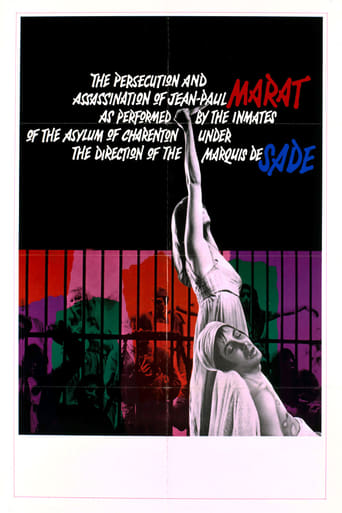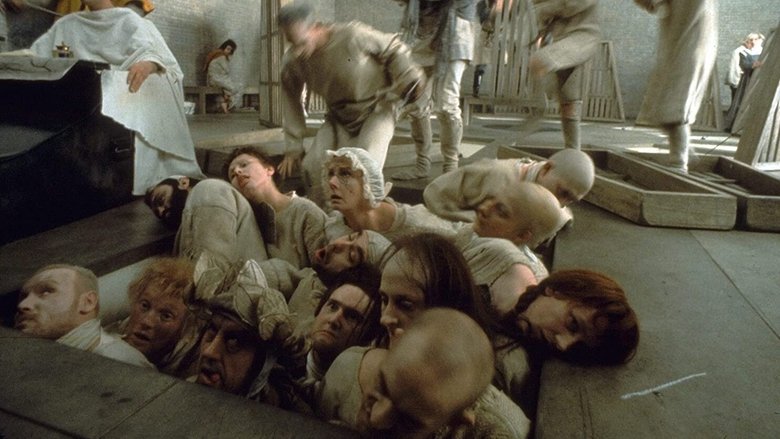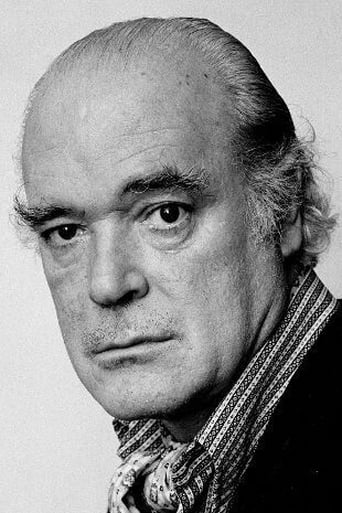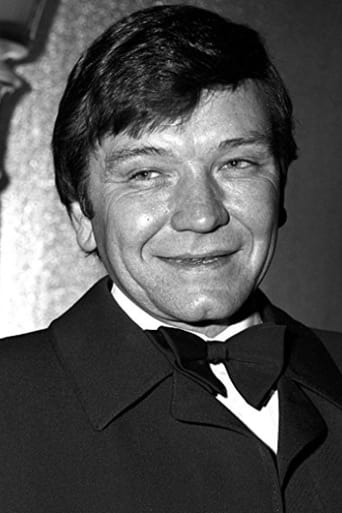Marat/Sade (1967)
In Charenton Asylum, the Marquis de Sade directs a play about Jean Paul Marat's death, using the patients as actors. Based on 'The Persecution and Assassination of Jean-Paul Marat as Performed by the Inmates of the Asylum of Charenton Under the Direction of the Marquis de Sade', a 1963 play by Peter Weiss.
Watch Trailer
Cast
Reviews
Touches You
Boring
The storyline feels a little thin and moth-eaten in parts but this sequel is plenty of fun.
This movie tries so hard to be funny, yet it falls flat every time. Just another example of recycled ideas repackaged with women in an attempt to appeal to a certain audience.
The play absolutely deserves every award it has received. It's a serious but blackly humorous -- or humorously black -- discussion of politics, philosophy, and just what constitutes sanity, with enough madness to hold our attention and enough roots in the real world that we can't easily dismiss the points it makes.In the film there are few directorial choice that I might quibble with, and there is one (not very important) change I definitely disagree with... but overall it's a surprisingly good job of translating the first Broadway production to the screen.(I have both the Caedmon complete recording of the Broadway production and a copy of the film, and I've played de Sade, so I'm a bit more aware of the details than most viewers would be. Alas, I can't read German so I can't compare any of these to the "real" original.) If you can find a good live production of Marat/Sade, see it. If you can't, or if you want to revisit it, the film isn't too far behind.
I just watched the MGM DVD, which is a fine letterboxed transfer. (I also saw the movie a few years after it was released.)Marat/Sade is an amazingly original and stunningly powerful philosophical and psychological descent into one of the most complex periods of recorded history, the French Revolution, the Terror that ensued, and the rise of Napoleon and his empire. The multi-layered ideas come thick and fast; I had to watch the movie over two nights because there's so much to think about, and some of the words and images are so overwhelming.Of the Royal Shakespeare Company actors in the film (little known at the time), Glenda Jackson had the most notable subsequent career, but Ian Richardson (Marat) has also done remarkable things (and he's so young here, you may not recognize him).This is not a movie for casual entertainment, but if you care about history and the deepest questions of good and evil and free will, you'll find much of value here.
This film and play were especially popular in the 60s, because at that time you could get an audience by promising lots of violence and sex on stage (although this movie is mild compared to the current crop). Marat/Sade became one of those things that the "in crowd" had to claim to have seen. The actors in the original production (look for Glenda Jackson's comments) hated the play because it was so harrowing and demanding; it grates upon the audience, too. If you enjoy lots of pretentious posing, shouting, and gratuitous rudeness, then submit yourself to this agonizing bit of cinema.One good thing: watching this film finally clarified for me where the Bonzo Dog Band got the song line: "We are normal and we want our freedom!" Which is what I began to shout about 20 minutes in...
MARAT/SADE is the film version of a play that arose from an actor's workshop exploring various theatrical theories expressed by French actor-director-writer Antoine Artard, who extolled a style of performance he described as "theatre of cruelty"--which, broadly speaking, consists of an assault upon the audience's senses by every means possible. Ultimately, and although it makes effective use of its setting and the cinematography mirrors the chaos expected of such a situation, the film version of MARAT/SADE is less a motion picture than a record of a justly famous stage play that offers a complex statement re man's savagery.The story of MARAT/SADE concerns the performance of a play by inmates of an early 1800s insane asylum, with script and direction by the infamous Marquis de Sade. (While this may sound a bit far-fetched, it is based on fact: de Sade was known to have written plays for performance by inmates during his own incarceration in an asylum.) The story of the play concerns the assassination of the revolutionary Marat by Charotte Corday, but the play itself becomes a debate between various characters, all of which may be read as in some way intrinsically destructive and evil. Since all the characters are played by mentally-ill inmates of the asylum (the actor playing Marat, for example, is described as a paranoid, and the actress playing Corday suffers from sleeping sickness and melancholia), the debate is further fueled by their insanity, unpredictability as performers, and the staff's reactions to both their behavior and the often subversive nature of the script they play out.Patrick Magee as de Sade, Glenda Jackson as the inmate playing Corday (it was her breakout performance), and Ian Richardson as the inmate playing Marat offering impressive performances; indeed, the ensemble cast as a whole is incredibly impressive, and they keep the extremely wordy script moving along with considerable interest. Even so, it will be obvious that the material works better as a live performance than as a film, and I do not recommend it to a casual viewer; its appeal will be largely limited to the literary and theatrical intelligentsia. The DVD includes the original theatrical trailer, but beyond this there are no extras of any kind.Gary F. Taylor, aka GFT, Amazon Reviewer





